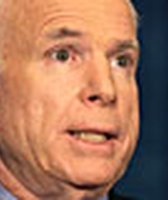Stand up for the facts!
Our only agenda is to publish the truth so you can be an informed participant in democracy.
We need your help.
I would like to contribute
SUMMARY: Presidential candidates often make historical references to emphasize points or justify positions. A lot of the time, though, they get it wrong -- to the dismay of historians.
The rhetoric of the 2008 presidential campaign is tough for historians to stomach.
All too often the candidates invoke former leaders and past eras as they emphasize a point or justify a position.
Look no further than Rudy Giuliani's latest television ad, Mitt Romney's speech about being Mormon or Hillary Clinton's reasoning for estate taxes.
Who doesn't want the Founding Fathers on their side?
But historians sour because candidates frequently get the facts wrong.
"I think for most historians it's very frustrating to watch politicians use history," said David Farber, a Temple University history professor. "We are happy they are sharing American history but I think it becomes an exercise more in the ludicrous claims than the legitimate."
Take Mike Huckabee's statement during a Republican debate in Orlando that most of the signers of the Declaration of Independence were clergymen. ( Pants-on-Fire wrong! ) Or Duncan Hunter's assertion in a Fox News interview that George Washington prayed every day and had his own field manual of prayers. Both claims are completely untrue, historians say.
In fact, only one signer was an active preacher at the time, John Witherspoon, a Presbyterian minister and president of the College of New Jersey, now Princeton University. A leading religion Web site, Adherents.com, said three others were former clergymen, but not most of the 56, as the former Arkansas governor and Baptist minister said.
Likewise, Hunter, a Republican congressman from California, ignored the fact that Washington's religious convictions are a point of major contention. Biographers such as Rupert Hughes debunked the myth about Washington's so-called prayer book in the early 20th century.
"People tend to attribute their own views to someone in the past," said Phil Chase, a historian at the University of Virginia. "The Founding Fathers are very important to what's going on. ... (But) if you are going to comment on it historically, you should try to get the facts straight."
Call it cynicism, but Leo Ribuffo, a history professor at George Washington University, doesn't expect politicians to always get it right. He says he doesn't like when the media parse candidates' speeches to verify the historical material.
"I have lower expectations," he explained. "I don't think political speeches are expected to accurately represent the past. ... One of the problems with real history is it's too complicated to get into a political speech or a newspaper article."
It's a valid point, especially when candidates make statements on the fly, historians say.
Still, others argue that someone seeking the highest office ought to know the facts before speaking. "It's one thing if it's a simple mistake, but often they misconstrue on purpose," said historian John Alexander at the University of Cincinnati.
When cited properly, politicians realize the potency of historical moments. When Romney, the Republican former governor of Massachusetts, gave a key address on his Mormon faith in December 2007, he accurately quoted a speech Samuel Adams gave to the First Continental Congress in 1774 about the importance of accepting many faiths. And John McCain supported his position against waterboarding as an interrogation technique by correctly noting that Japanese soldiers after World War II were hanged for such crimes against U.S. prisoners.
More often, historians see candidates use the right historical facts and then blur the edges to fit their interpretation.
Case in point: Giuliani's TV ad airing in New Hampshire, experts say. In the 30-second spot, the former New York City mayor focuses on the importance of national security by recounting the Iran hostage crisis.
Giuliani gets the facts largely correct but insinuates that Republican President Ronald Reagan deserves the credit for the hostages' release moments after his inauguration — not outgoing Democratic President Jimmy Carter. Experts call the ad misleading.
"It happened that they did not hit Algiers until (Reagan) was in office about a half-hour," Warren Christopher, Carter's deputy secretary of state who led the hostage negotiations, said in an interview. "But all the negotiations took place before the inauguration."
Clinton took a similarly selective approach to history during a recent forum in Derry, N.H. When a voter asked about her plan to use estate tax revenue to pay for universal retirement accounts, the leading Democratic contender turned to history and slipped in a dig at the GOP.
"The estate tax, which came into being by Republicans like Teddy Roosevelt and others ... is there for a real simple reason: In America, we've never liked the idea of massive inherited wealth."
But it was war, not wealth, that prompted the first estate tax levies dating back as far as 1797. Clinton is correct that Roosevelt supported an estate tax, but it didn't become law until 1916 when Woodrow Wilson, a Democrat, used it to pay for World War I.
Even more, the framework for the modern estate tax system was developed by another Democratic president, Franklin Delano Roosevelt.
To be sure, the candidates don't deserve all the ire. Much of their words are scripted by speechwriters and researchers.
Doug Gamble has written speeches for two presidents and many other politicians. The California-based writer's forte is humor, but he's careful when it comes to history.
"As a writer myself, when I use historical references I would do absolutely everything I could to verify its accuracy," he said. "I'd hate to contribute to the embarrassment of the candidate."
Our Sources
Interview with David Farber, Temple University professor and author of "Taken Hostage: The Iran Hostage Crisis and America's First Encounter with Radical Islam," Dec. 6, 2007
Fox News transcript, CQ Transcripts Wire, Oct. 31, 2007
Interview with Phil Chase, senior editor, the Papers of George Washington Project at University of Virginia, Dec. 6, 2007
"The Religious Beliefs of Our Presidents," by Frank Steiner, 1936
"George Washington: The Human Being and the Hero (Vol. 1)," by Rupert Hughes, 1926
Interview with Leo Ribuffo, history professor, George Washington University, Dec. 6, 2007
Interview with John Alexander, history professor, University of Cincinnati, Dec. 6, 2007
Interview with R. John Pritchard, author of "The Tokyo War Crimes Trial: The Complete Transcripts of the proceedings of the International Military Tribunal for the Far East," 1981, Dec. 7, 2007
Interview with Yuma Totani, history professor at the University of Nevada-Las Vegas, Dec. 7, 2007
"Drop by Drop: Forgetting the History of Water Torture in U.S. Courts," Columbia Journal of Transnational Law, May 2007
Interview with Warren Christopher, former deputy secretary of state in Carter administration, Dec. 7, 2007
U.S. State Department, The Islamic Republic of Iran vs. United States of America
MSNBC First Read, Clinton Questioned on Estate Tax
National Center for Policy Analysis, Estate Tax History Verses Myth
Center on Budget and Policy Priorities, The Estate Tax: Myths and Realities
U.S. Department of Treasury, History of Taxes
Debra Rahmin Silberstein, A History of the Estate Tax A History of the Estate Tax, Brandeis Graduate Journal, 2003
Interview with Doug Gamble, speechwriter, Dec. 6, 2007







































